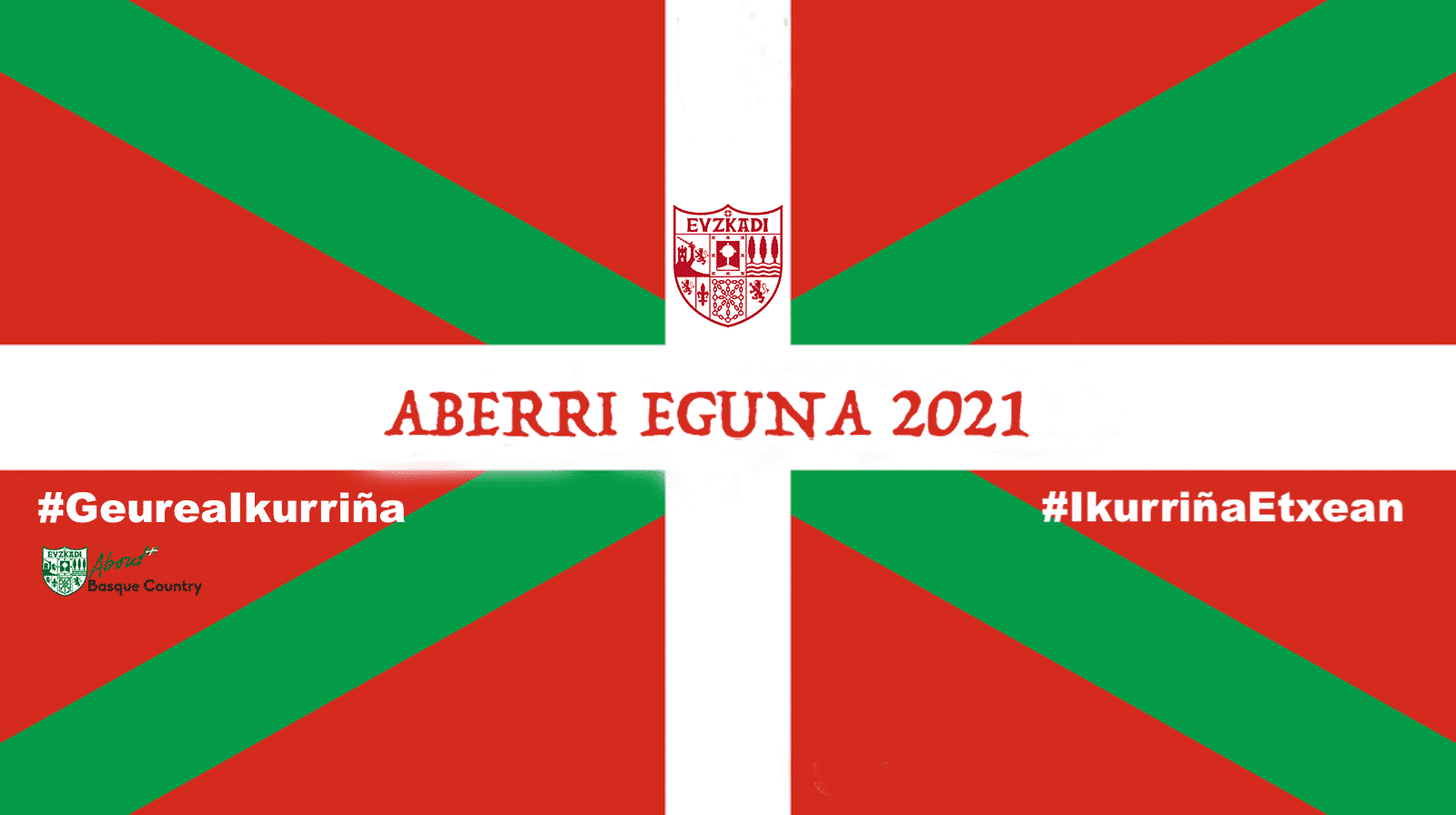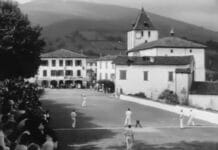Tomorrow is the Aberri Eguna. Once again, this year’s Aberri Eguna will be a special one due to the very complicated situation the world is still going through.
But it’s still the Aberri Eguna, that day we Basque patriots again stand up to demand our nation be able to exercise its right to take its own place as an equal among the nations of the world, and to have the Ikurriña flying at the European Parliament and the UN in New York.
We believe this is a moment for reflection, a moment to remember all those who sewed the idea of freedom for the Basques as equal citizens of a modern state, subject to no king or kingdom. At the end of the 1800s, on both sides of the Pyrenees, in the Northern Basque Country and the Southern Basque Country, a group of patriots saw what it meant to recover Basque freedoms and began to set out the idea, based on the parameters laid out by contemporary nation-states, of a nation Basque community as a state.


In the Northern Basque Country, the idea of Zazpiak Bat was defined by some pioneers of the Basque renaissance in that part of the country that had suffered so greatly under French centralism. Meanwhile, in the Southern Basque Country, after the tragedy of abolition of the fueros by the liberals, “foralism” most, if not all, Basque social and political sensibilities. But another, fundamental, step was taken when Sabino de Arana y Goiri started a political movement that would lead to the awakening of our homeland as a political community with the desire to constitute itself as a sovereign national reality.
The raising of the first Ikurriña, which has become a symbol of the Basque Homeland and freedoms, marked the start ofapath that must lead the Basques to their constitution as a confederation, made up of six/seven territories voluntarily joined as equals. That is what “Zazpiak Bat” means.
Without this step, without those first patriots, nothing of what we think and are now would be the same. The most likely scenario is that the predictions made by Élisée Reclus would have come true, and we would have disappeared as a people. This would probably have been largely due to push to stop being Basque and start being Spanish or French, as was fashionable at the time.
That feeling of building a nation spread through the Basque Diaspora like wildfire. We reflected on this in an article discussing how only four years after the passing of Sabino de Arana, a delegation from thr Basque Center in Buenos Aires paid homage to him at a ceremony in Sukarrieta. And they weren’t an exception.
This is because the members of the Diaspora, from its beginnings in the New World colonies, understood that the survival of the Basques and the defense of their interests meant joining together, organizing, recognizing each other as equals, all members of the “Basque Nation”. They did so in 1612 when they constituted the Brotherhood of Our Lady of Aranzazu in Lima, bringing together the members of the “Basque nation” from Biscay, Gipuzkoa, Araba, and Navarre. This brotherhood was a main part of a network of fraternities and guilds that spread all over the world, with the common goal of defending the interests of the Basques.
This way to organize would be modified over the 19th century with the birth of the New World republics (in whose creation and development Basques played a leading role), the Jacobean centralization of France and its tragic consequences for the Northern Basque Country, and the Carlist Wars and the abolition of the fueros. Of especial relevance were the massive exiles triggered by the political and social upheavals.
Perhaps the clearest example of that change, and of how the Basques organize, is the birth of Basque centers as we know them today. Many of these, such as the colonial fraternities and guilds, were born as places of mutual social aid. A leading model of this was the Laurak Bat in Buenos Aires, which was created as a reaction to the abolition of the fueros.
From there, and with the human and ideological support the arrival of the Francoist exiles, the Basque Community of the Diaspora must be considered not only a part of our Nation but also a key player in our society and politics.
That is something we must bear in mind for an event as important and symbolic as Aberri Eguna.
Therefore, in addition to giving our readers some some images of ikurriñas to be used on social media, we are, like last year, sharing the manifesto published by the Lima Arantzazu Euzko Etxea – Lima Basque Center to celebrate this Aberri Eguna.


This Basque Center has shared something with us that we found important. Two Basque-Argentines who are committed to spreading our culture, Gracela Estela Luna and Valeria Vallejo Luna, have been designated as representatives of this Argentine Eusko Etxea with the mission to create connections and find common points of collaboration and support.
This is a first step, but a very important one, in the process of creating networks like this Basque Center’s project. After all, Argentina is a leading country in the Basque Diaspora in the Americas, both for the number of Basques who live there and for how well they maintain their commitment to Basque culture and “essence.”
They are also in charge of leading the online Basque Dance classes this Basque Center has got going, aimed at viewers up and down the Americas.
This, to us, is an important and necessary step in creating global support and collaboration networks among Basques in order to bring them together, helping to join forces, share experiences, and spread best practices.
Limako Arantzazu Euzko Etxea – Lima Basque Center
2021 Aberri Eguna Manifesto
This Sunday, April 4th, we Basques commemorate the Day of the Homeland, Aberri Eguna. Just like on every Easter Sunday since 1932, all of us who believe that “Euzkadi is the Homeland of the Basques” have a date to show and renew our commitment.
We commemorate the moment when Sabino Arana understood that the only way the Basque People were going to be able to survive was by having a nation that stood on equal footing with all other nations. In 1882, he started down a path that would soon lead him to define the idea of Euzkadi as a republic, a confederation, in which Basque territories were united as brothers, free and equal.
Because in 1882, he, as a Biscayan, thought that this Basque territory should be free of the yoke that Spain had imposed on it after the Carlist Wars. He didn’t take long in understanding that this idea of Freedom had to extend to all Basque territories, both those which had been subjected to the French Republic as well as those subjected to the Kingdom of Spain. They laid down a path to Freedom which would lead them to constitute that Confederation, Euzkadi, which would unite all the Basques while respecting their individual histories and traditions.
He was 17 at the time. From that moment, when he understood that a Basque must not be either French or Spanish, until his death, not even 20 years passed. In that short length of time, thanks to a prodigious amount of work, he awakened the Homeland and set in motion a national liberation movement which saved our Homeland from the fate of being diluted into History, as has happened to so many nations that have been swept away by the victors. He prevented that defeat.
This is going to be yet another complicated year due to the health crisis caused by the epidemic. We Basques all over the world will not be able to join up to celebrate the day when we recommit ourselves to the Cause of the Basque People. Once again, it’s not going to be an easy Aberri Eguna. That’s why, once more, we need to fill our windows, balconies, social media, and hearts with Ikurriñas, the ensign of our Nation.
Euzkadi needs us. She needs our commitment every day, but on this Day of the Homeland, she again needs us that much more. She needs us to light our streets and our social media with our national colors: red, white, and green.
Gora Euzkadi Azkatuta
And our wish for all:
Health and a Basque Republic!
“Because they were, we are; because we are, they shall be”
The chain shall not be broken!
“We Basques must, in our adoptive homelands, be, among all, the best citizens”
“The Basque Centers around the world are the representation of our Country”
José Antonio de Aguirre. Lehendakari
Last Updated on Apr 4, 2021 by About Basque Country






